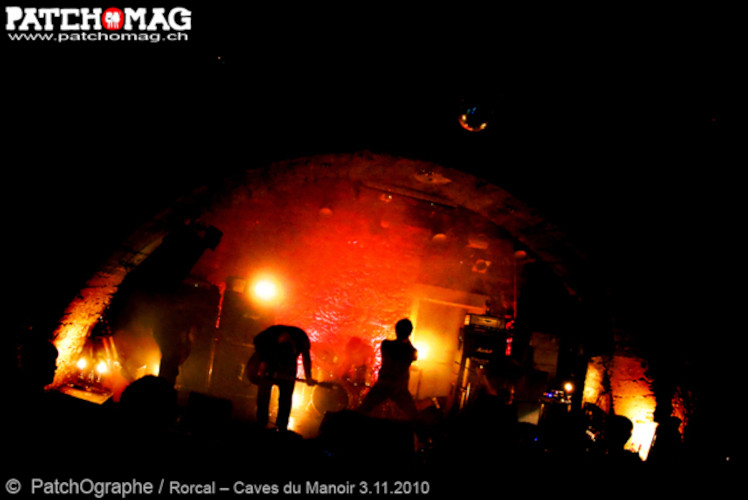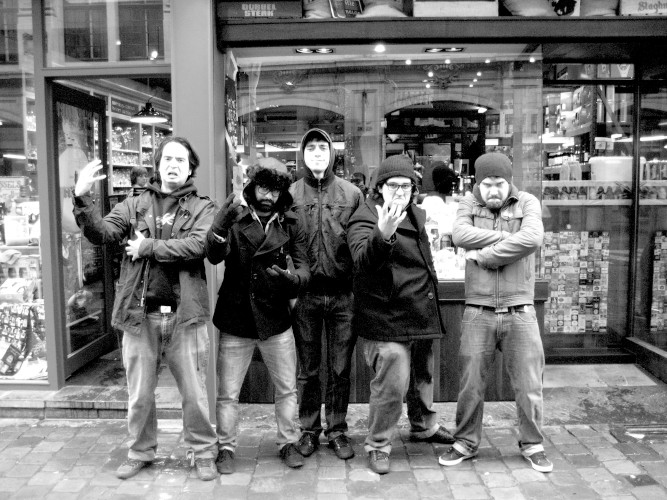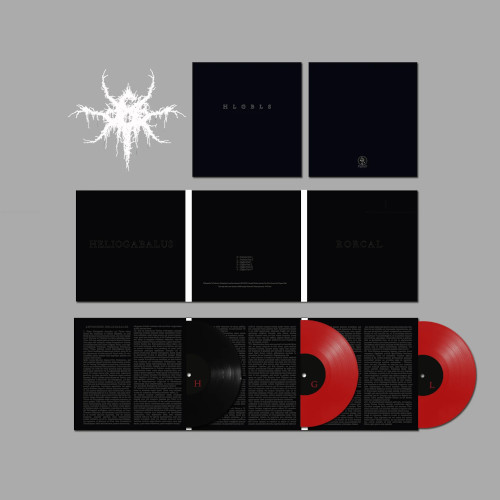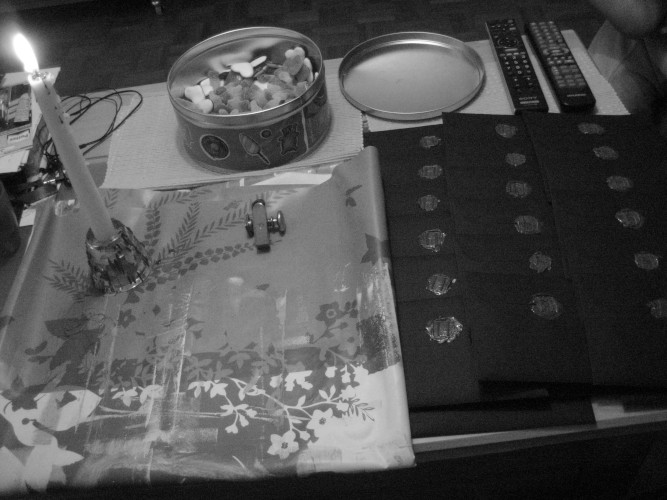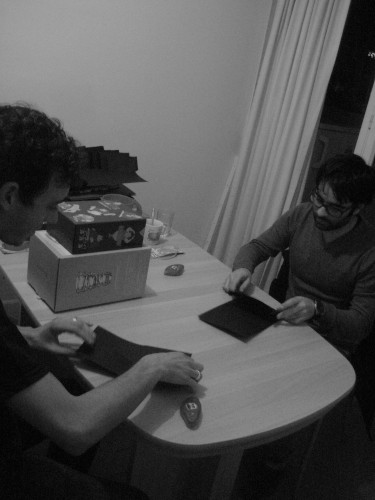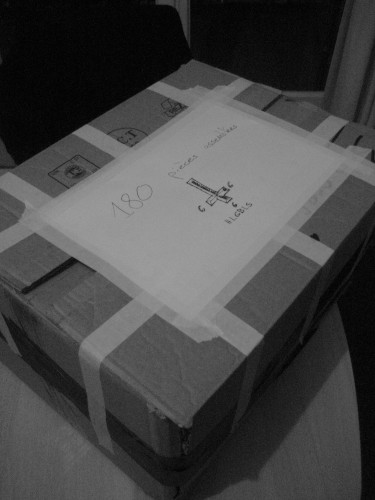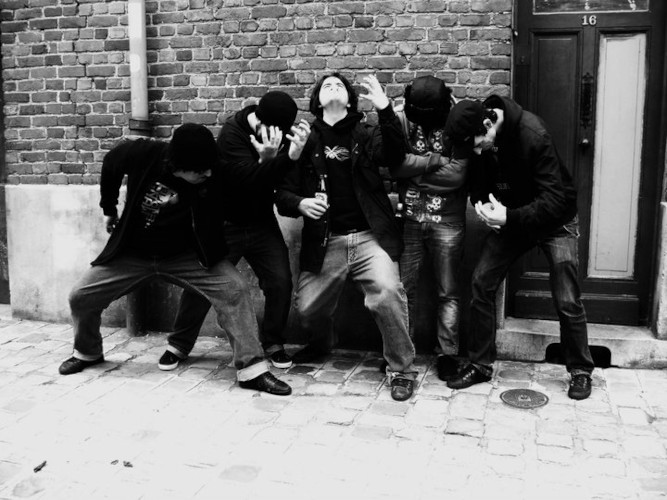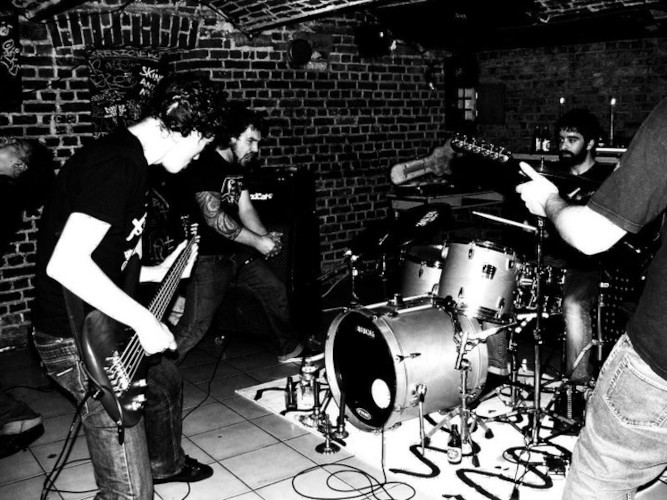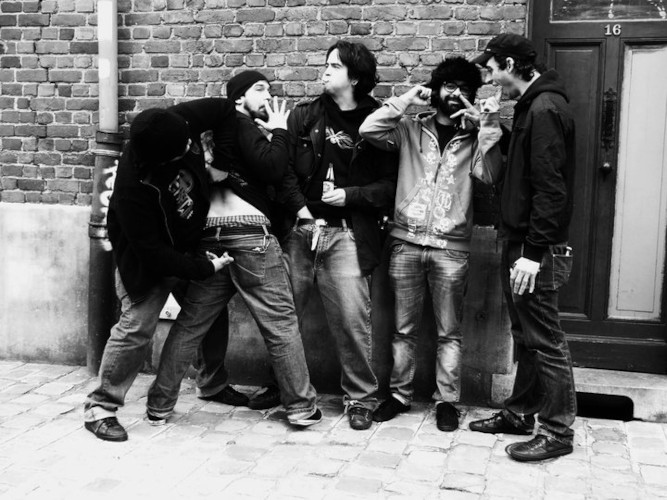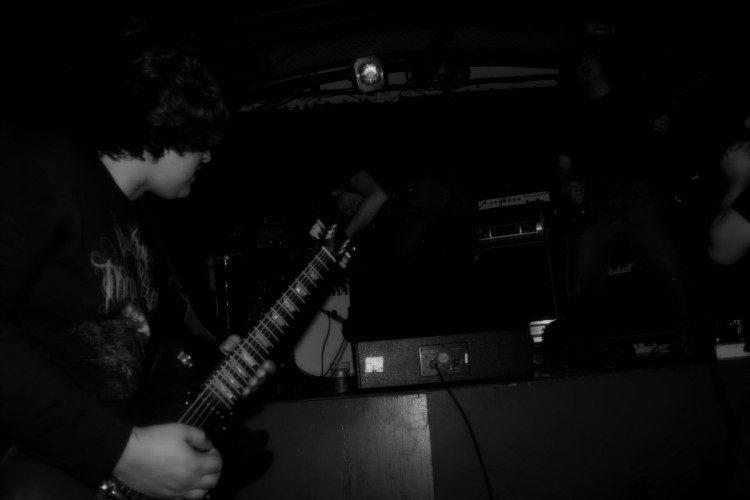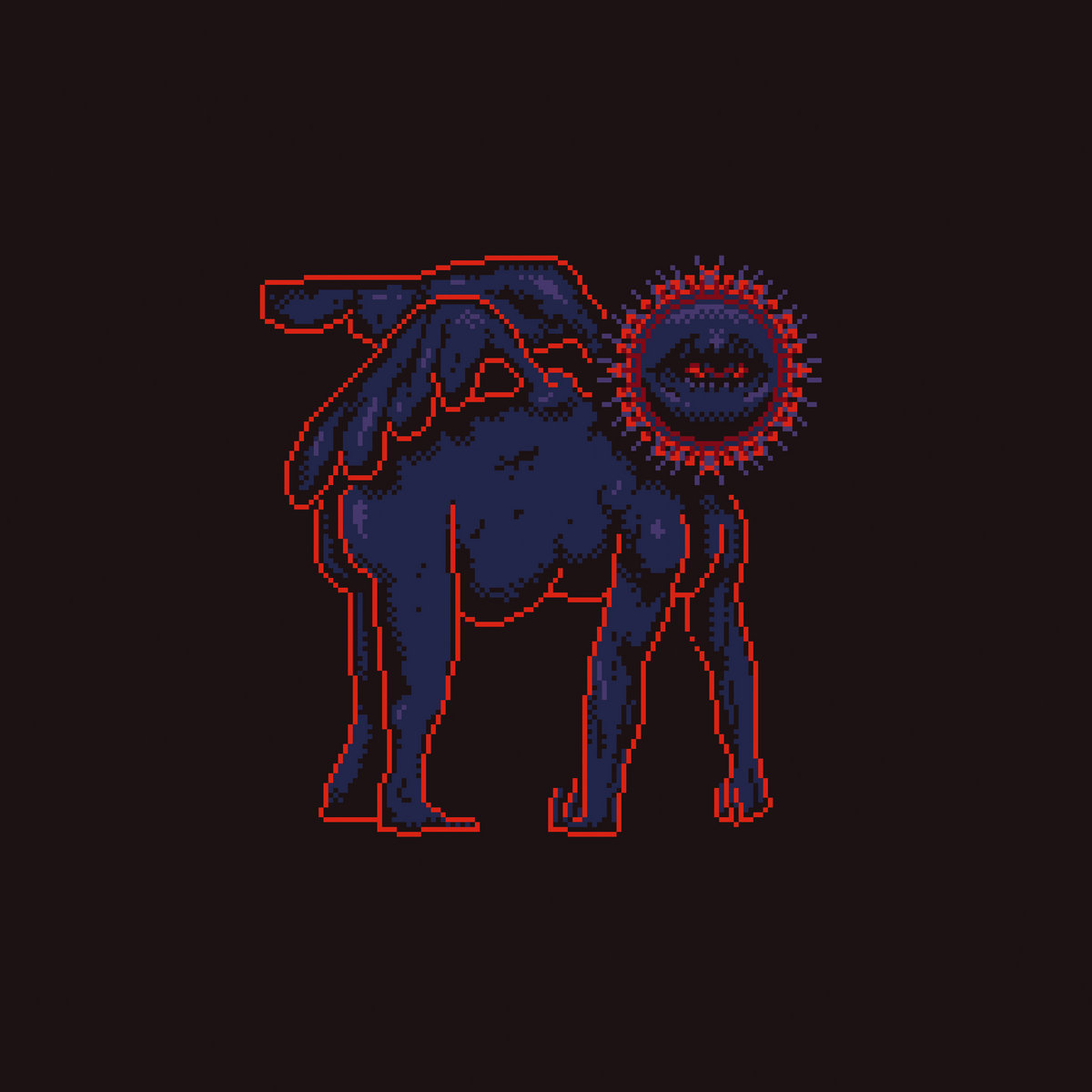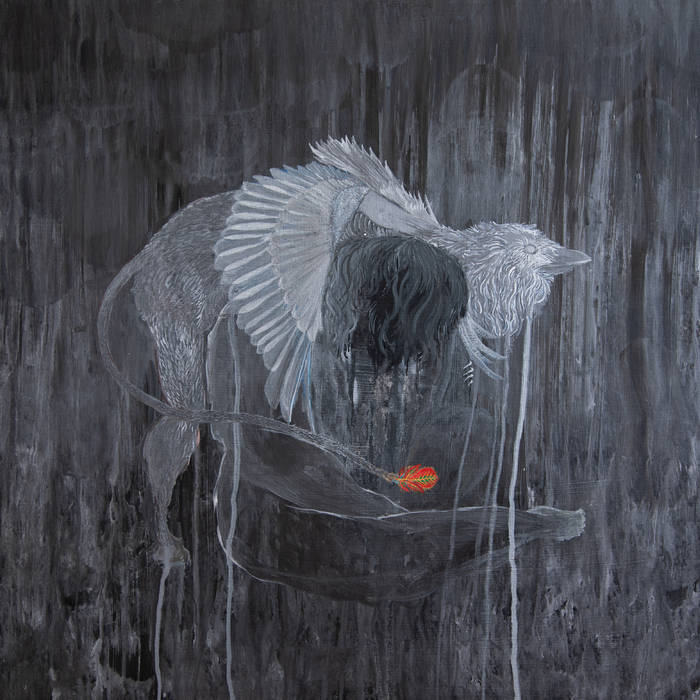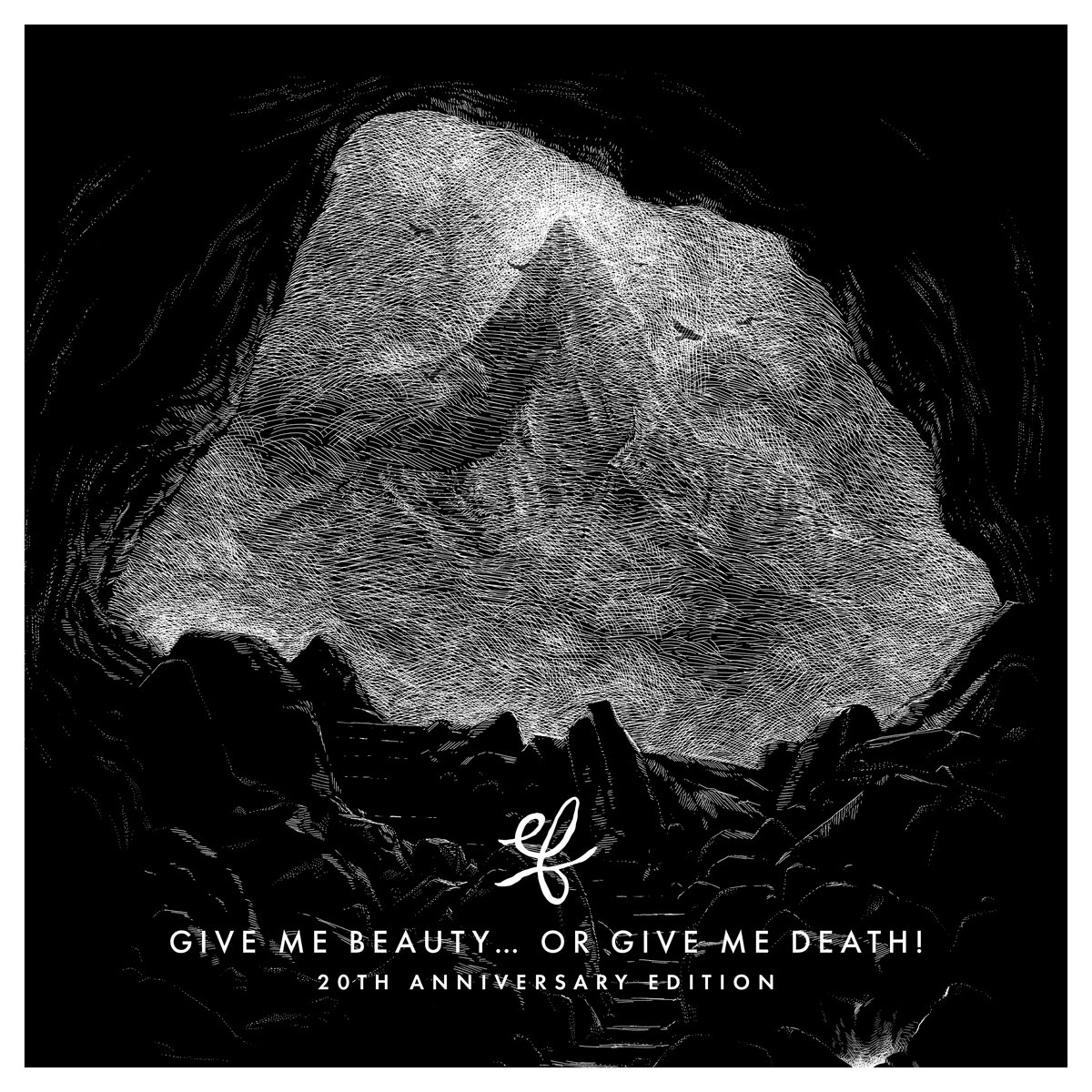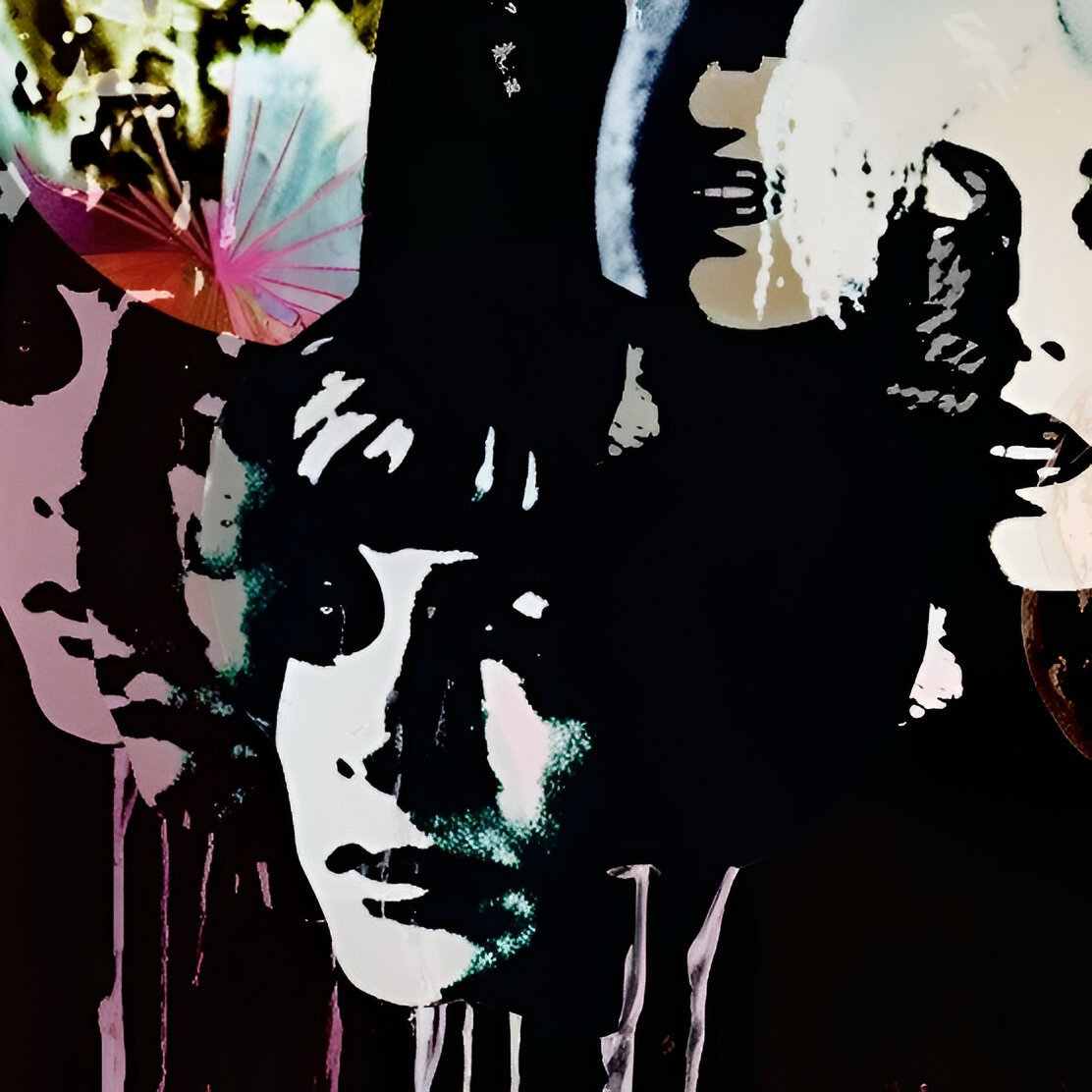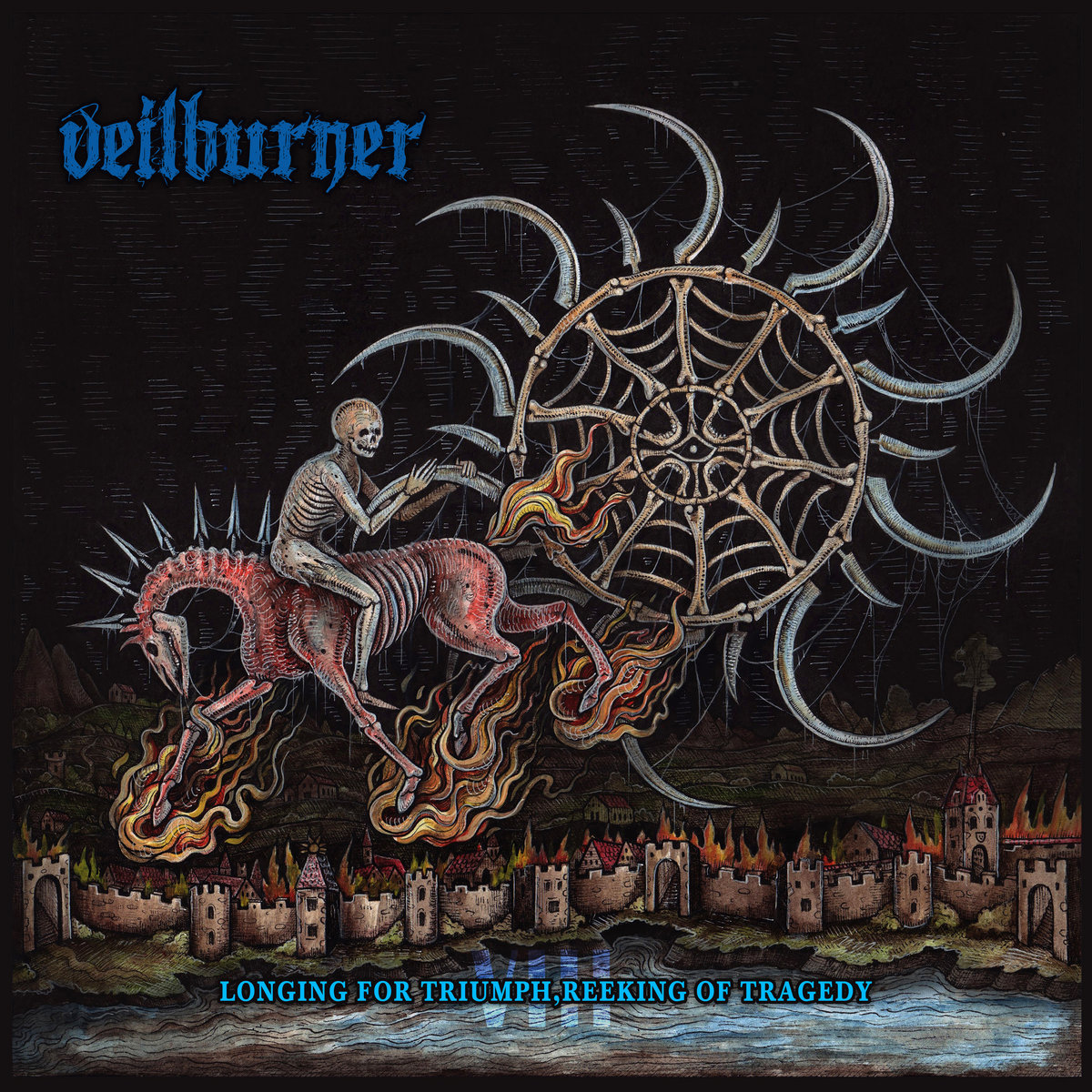adawdasasdasdasdawdaw We have always been talking about something like this here at Veil of Sound - looking back at records that changed the game. However, we do not want to be one of those pages dwelling on nostalgic trips back in time because Record ABCXYZ has just had its 5th, 15th, 25th or 58th release birthday. No, there must be something else, so do not expect this to happen every month but irregularly. To start a “series” like this, we took a re-release as our initial point: Rorcal’s definitive record Heliogabalus (or just HLGBLS) will see its vinyl debut next week by Wolves & Vibrancy records. Which darker way to start? Wonderfully none!
You will quickly see how much information and detail we put into these big specials when noticing the sheer mass of things we line up here: A detailed interview with the band about the record, statements by the producer and the guys behind the label re-releasing it. A photo gallery with pictures from around the time of the original release and, of course, a short review. So let’s go!
"We decided to go for a super long super doom song, then established the concept, then starting writing the music"
Rorcal on the birth of HLGBLS
You can pre-order the re-release via Wolves and Vibrancy Records or try to get it from the band itself at their live shows.
"It was the first album we recorded in live conditions and it felt like playing in rehearsal."
The band on the recording process.
This is what producer Raphaël Bovey has to say on the experience of mixing this record:
Heliogabalus was my first time mixing a Rorcal album.
I was familiar with their previous effort and had seen the guys live a few times but had no idea how extreme they suddenly went with this new piece. My first impression at the time hasn’t changed more than a decade later: Heliogabalus is probably the heaviest and most radical Doom record that’s ever come out of Switzerland and can easily compete with many heavyweights in the genre worldwide.
The mixing process went smooth and easy. The band just wanted to sound as heavy as possible and I tried to do just that, taking care of pushing the insane weight of their sound to its full potential while also trying to give it a sort of cinematic feel to help gluing the different parts together and somehow keep the listener’s attention despite their often agonizing length.
All in all it was quite a unique experience that would lead to a fruitful collaboration between me and the band that’s still going on to this day.
"I think releasing this record in vinyl was something he also had in mind for quite some times."
Drummer Ron on the re-release on Wolves and Vibrancy
Fabian, the mastermind behind the record label has the following to say about the record and the re-release:
The history between Rorcal & me goes way back to 2011 when I first saw them live in a now defunct rehearsal room in Karlsruhe, Germany. Small room, loud, singer was kneeling on the floor screaming & this show made a lasting impact on me - the energy was so dense, [and] it was a cold night in December.
One year later a friend of mine told me that Rorcal were looking for a label to release their upcoming album Vilagvege on tape - which went on to be our best tape release to this date. Over the years we co-released two follow-up releases on vinyl. Within the last few years I created a list of releases that have never been released on vinyl, something like a dream list that includes Ephel Duath’s Pain Necessary To Know, GTUK (the 8bit grindcore project from Sebastian from Sun Worship) among others & of course Heliogabalus by Rorcal.
Ron from Rorcal & me started discussing a possible release in early 2021. It’s been clear [since then] for both sides that if it were to be released on vinyl it should include “Prelude to Heliogabalus” and to make the album package complete, it would mean a 3x12” vinyl edition, so this is without a doubt the most expensive production ever released by us - we wanted to make it one of a kind, something that does the music justice & reflects the style of the initial CD edition: emboss on the front, varnish on the inside on a coated surface.
Since it’s the first time this record will be released on vinyl (and most likely the only time) & on digital platforms we decided to handle it like a new record promo-wise. We did not want to just put it in our shop & that’s it. Although originally having been released in 2010, the record still holds up & could easily be a 2023 release. That’s why I asked Eeli (Fawn Limbs among others) to create some teaser clips that illustrate the topic of the album, the decadence of the Roman emperor, Heliogabalus.
Rorcal was the first band I witnessed playing that kind of black Metal/Doom Metal not being part of the cliched / traditional black metal scene so they hold a special place in my heart.
And even after all these years the intro of Heliogabalus, the hi-hat part that feels endless untill the first riff starts, hasn’t lost anything of its fascination & power. “This album is scary, really aggressive, completely gloomy” was said of the record back in 2010 & if you missed it back then, now is the time to discover it.
And now - here is the full interview we did with the band on this opus magnum of theirs.
When looking back at Heliogabalus – what is still engraved in your memory the strongest about the time of its inception?
For me it would be this shared will of creating something super extreme. By the time we started writing Heliogabalus, we already had written a few 30ish minutes songs (Monochrome, Split with Khelvin). We were already into slow stuff, but taint with a bit of post-rock influences. In my memory, we all shared this will to go deeper, slower, longer and harsher.
What came first – the concept or the music? Is that always the same? Concept or music first?
I think we decided to go for a super long super doom song, then established the concept, then starting writing the music. For all the albums that would follow Heliogabalus, we always started with the concept and write the music accordingly.
Who came up with the idea to talk about Elagabal (or Heliogabalus)?
It was me, while I was reading A. Artaud’s Heliogabale, où l’anarchiste couronné.
How important is it for you to intertwine both?
It is very important for us. I mean we always intertwine the music and a concept that we use as a guideline. We feel like we’re telling a story, and that the album is a whole piece instead of a succession of songs put in a theoretically exchangeable order.
Do you remember what inspired you musically back then? What would that be nowadays?
If I recall correctly, we were listening to a lot of the early 2000’s US doom-drone scene: Yob, Khanate, SunnO)), etc. And some more chaotic-hardcore stuff – local for some of them: Knut, Shora, Koreish… I suppose those were some inspirations.
Which books (modern day biographies) and ancient sources did you consult for the concept behind the record?
Clearly it was A. Artaud’s “Heliogabale, ou l’anarchiste couronné” that was our main source. The main historic source – whose reliability is contested – is the Historia Augusta. We used scans of a recent edition of this book for the cover artwork.
There are so many fascinating aspects connected to that story – which one struck you personally most?
Artaud depicts Heliogabalus as someone with of total disregard for all the codes and dogma of the Roman empire. He was from far away in the East, raised in an Eastern pagan culture and religion, crowned emperor at a very young age after a game of political intrigue. Looks like he just said ”F*** it, let’s move everything I am in Rome. Let’s bend Rome to what I am.” And for four years it looks like he actually did it. As decadent as the sources are depicting his reign, I think this is some serious free thinking!
Heliogabalus was a former Roman emperor who made so many enemies in his short reign (four years only) that he was not only killed but also posthumously sentenced with the “damnatio memoriae” which means that his name for basically erased from history. Isn’t that a really creepy story and showing how much was still possible for emperors and rulers back then?
Yes, his end was gruesome, but again, I think what interested us more was this kind of esoteric stone worshipper anarchist free thinker depicted by Artaud.
At the same time that might have been understandable as he is said to have been nothing but a hellish example of decadence. We all agree that that doesn’t constitute a reason for murder, but would you say that he was killed because of ruining Rome’s reputation?
If I recall correctly what I’ve read about him, this was a time when Roman power was already divided between several forces and that the heads of the army lost patience and trust in Heliogabalus’s way of ruling, which by this time was good enough reason to kill an emperor.
Is that also a metaphor for today – we often (socially) exclude people who are too narcissistic?
Maybe, but we didn’t really explored the narcissistic part of the character.
His personality has that “reputation” - would he be someone with whom you’d like to have a drink? Why (not)?
Would I like to have a drink with Heliogabalus? Never really thought about that. I think I’d prefer to get a chance to watch him being himself and behaving normally, see how close – or far – form the sources he actually was.
Is he also a kind of symbol for our time, as we very often pretend to be someone we are not – especially on social media? I mean, he said he was the son of an emperor although he wasn’t! Is that also another aspect of his that interested you back then?
Not really actually. But we were interested in the idea that the sources being so dubious, we can only fantasize who Heliogabalus really was.
Another fascinating thing about him is his different religion, which he tried to impose on the citizens of his empire – would you place, in that aspect, place him in a long line of people? Echnaton for example?
There are certainly many examples in history of people trying to impose their beliefs and maybe Heliogabalus can be considered in one of those. But, honestly, this is really not my area.
He promoted the religion linked to Heliogabalus – a religion seemingly connected to large stones and in some way seemingly a role model for the Kaaba of Mekka today – do you also want to criticize religion with your record?
No. We never used our music to specifically criticized a religion.
The record’s intention is a multi-faceted one – can you maybe once and clearly say why you wrote a story about him? Can he serve as a negative image for our own society?
We wanted to go extreme, to go “hardliner”, to find our own sound and get rid of as many influences as possible; and see where it leads us. For that we used, as a guideline, the life of a historical figure that sources depict somehow as an extreme but also extremely free figure. A history of violence but taint with esoteric ideas and a will of getting rid of what is established but doesn’t really look like oneself. Heliogabalus seemed just fine for this purpose!
You seem to have a liking for such difficult topics?
We’re always looking for topics that have a great narrative potential. Topics that are telling a story that we can appropriate and retell in our own words and sounds.
Was your songwriting process different back then from what it is now?
Yes, it definitely is. Back then it was much more instinctive. It was hard work, but on a blanker canvas. Now it has become a much more intellectualized process. I mean as we always try to evolve in our writing, the more we’re writing, the more demanding we get with ourselves. I think the writing process is actually where we’re the most demanding with ourselves in this band. We’d hate the sensation of releasing some music that doesn’t feel like the culmination of a process, but just some new songs written by following paths we already followed. Of course, we have our sound, and a Rorcal tune sounds like a Rorcal tune. And I personally am proud of having created a genuine and homogeneous artistic identity with my band – [or] at least having the feeling of it. But still, we want to make our writing evolve in our own style. We want each record to possess its own identity while still being Rorcal. This is getting harder every time!
The line-up back then featured Bruno who probably did a lot of the noise elements on the record, how hard is it nowadays to reproduce the songs live without him? - or does it hinder your songwriting process in any way?
Actually, Bruno didn’t do any noises on Rorcal records. He was strictly a bassist. For Heliogabalus, it was JP and I who did them, as it was the case for all further records, including the new one. As a noise maker, Bruno worked only with Rorcal for the Earthflesh/Rorcal split we recorded. We always use a noise launching pedal on stage to reproduce the noises that are on our records.
I assume that your music is the result of a highly precise process before you enter the studio – how clearcut is your mental image of what will come?
When we enter the studio, the music is always 99% done. We record everything we’re playing in our rehearsal room. As a result, we have a super precise preprod when we enter the studio. Some very small changes can occur though: additional guitars, doubling of a few voices, but that’s pretty much it. We never stay more than 3 or 4 days in studio. We need to know exactly where to go when we’re there.
Was the recording of Heliogabalus an especially difficult or different one? What do you remember about it? I don’t recall it as a particularly difficult moment. We knew where we were going, we were kind of ready. It was the first album we recorded in live conditions and it felt like playing in our rehearsal space. Besides there are no super technical parts on this record (I know, if you’re into Animal as leaders, there is no such thing as a technical Rorcal album) and we could really focus on the dynamics.
You wrote a prelude to the record – why?
We wrote the prelude in collaboration with Music for the Space from Geneva. If I recall correctly, we were planning the 3rd tour for the release of the album and we wanted to propose a “tour edition” which became a double CD limited release.
The prelude itself is a 33-minute long track which only in the final five or six minutes erupts a little bit. Why did you choose that structure?
Like our more instrumented songs, we just go with the flow. There were no specific structures.
There are some vocals on the record – who did those and why not on you guys?
Some good friends of ours who have creepy voices.
Should people hear it as a sequence – the prelude first and then the whole record?
That is exactly the point! We actually performed it live once. The full prelude and then the full Heliogabalus.
On the original CD release the HLGBLS story was split into 66 tracks – why that?
Frankly, if we could have split it into 666 tracks, we’d have done it! However, listening to Heliogabalus in random mode is quite an experience!
The packaging of the original release was mindblowing – did you manufacture all of them by hand?
Yes, we did! We organized little craft sessions when we folded the paper, sealed the envelopes and assembled every part! The booklet of the first edition was even sewn by the mother of one us. It was a very DIY process!
What can we expect of the packaging for the new release?
Something very much alike the cd versions, but bigger!
The record will be a triple vinyl edition – will it include the prelude?
Yes, the 1st vinyl will be the prelude.
How did you split the tracks this time?
We split the prelude in two and the main piece into four movements.
How did it feel to re-visit HLGBLS for you?
Releasing this record on vinyl was something we always talked about. It feels like an achievement to finally have the opportunity of doing it. Besides, I personally think that it is a record that still makes sense. I took advantage of the situation to listen to it again, and it was my conclusion anyways! The production, the intention, the loudness, the atmosphere. I don’t think I would do it differently today.
Who came up with the idea to finally do a vinyl version for this one (there was none yet, right?)?
Wolves and Vibrancy approached us with this idea. We worked with Fabian few times before on different releases so he’s a good friend of ours. I think releasing this record in vinyl was something he also had in mind for quite some times.
How did the collab with Wolves and Vibrancy came to fruition? Why not on Hummus Records?
It really was on the impulse of Wolves and Vibrancy that we’re doing this release. I mean we had that in mind for years, but it was Fabian that made the move and offered us this opportunity. We are still working with Hummus Records for the next album though.
Originally the record was also (partially) released through your own label – Cal of Ror. Why have you stopped doing that?
We’ve shut down CalofRor Records in 2013. The label was intentionally created to have a support for the band but mostly it was a small record shop. We stopped the shop so there was no meaning to continue as a label.
I know, artists do not like to rank records because they’re like children and who would rank his children?! But what importance do you give the record? Is it a pivotal point in your career?
I think Heliogabalus was an important step for the band. Even if Rorcal’s style evolved a lot in the meantime, I personally think this is the record that set our grounds. It’s the first that rotates around a concept, the first we recorded live, the first that was mixed by Raf Bovey, and definitely the first which defined some fundamentals of our sound: something extreme, rude, evolving, and personal.
And for the record, I do rank my children: cat no2 is a twat.
What do you remember of the reactions to the record? Did you like them or not? Why?
I do remember responding to an interview back then and the journalist asked me: do you realize how terrorizing it is? And frankly I didn’t. I mean I knew it was brutal and hardliner, but we had had fun writing it, we were super into this friendship of the young band that we were (we’re still friends, but we’re not that young anymore), the joy of playing more and more shows, etc. By the time we released this album, I remember feeling sincerely joyful about Rorcal and Heliogabalus, and it was very contrasting that the reactions, as good as they were, were mostly about the brutality, the violence of this record. In a way, I became aware of the brutality of this album through the eyes of others.
Do you think that people have understood the record by now?</i>
I suppose. This is not an easy listening album, but it’s not a hard one to fundamentally understand, I think. But anyways this new release will tell what Heliogabalus means for the audience today. And it will be interesting to see!
Somewhere on the original record you called yourself “The Theatre of Heliogabalus” - why that?
It was actually the series of photos featured in the CD booklet that was called “The Theatre of Heliogabalus”, as they are portraying some key moments of his life.
So what will come next? Can we get a hint?
It won’t be a 70min doom/drone piece! And it won’t talk about hope. We’ll say more on that in late spring this year!
Now onto our infamous quickfire round. You always get two alternatives and have to choose one, maybe give a short explanation for your choice.
Field Recordings vs. Computer Noise? Computer Noise. Easier to make when you are cat sitting.
Gang Shouts vs. Gregorian Chants? Gregorian chants. We are too old for Gang shouts..
Writing & Recording vs. Touring? Touring for me (JP). Traveling, meeting people, being of stage is one of the greatest feeling you can get.. and soon we’ll be old so we’ll just do writing & recording.
Books vs. Television? Book. I don’t have a TV
Antiquity vs. Modern Times? Modern times. Or Rorcal would sound like Wardruna without clean singing.
Black Metal vs. Noise Rock? Black metal. We are too old to listen to Noise Rock.
Swans vs. Neurosis? Swans in Live. Neurosis at home with a glass of wine.
SunnO))) vs. Burning Witch? SunnO))). I mean Monolith and Dimensions, it just doesn’t get any better than that.
Ultha vs. Ulthar? Ulthar. Because I love cats.
Pink Floyd vs. Deep Purple? Definitely Pink Floyd! Our biggest inspiration for the guitar sound :)
Okay, that’s not completely it, we were so lucky, that the guys even gave us a list of records that really influenced them (on this record) and of course, we want to give you those as a playlist to find out that last tiny bit more, “enjoy”!

